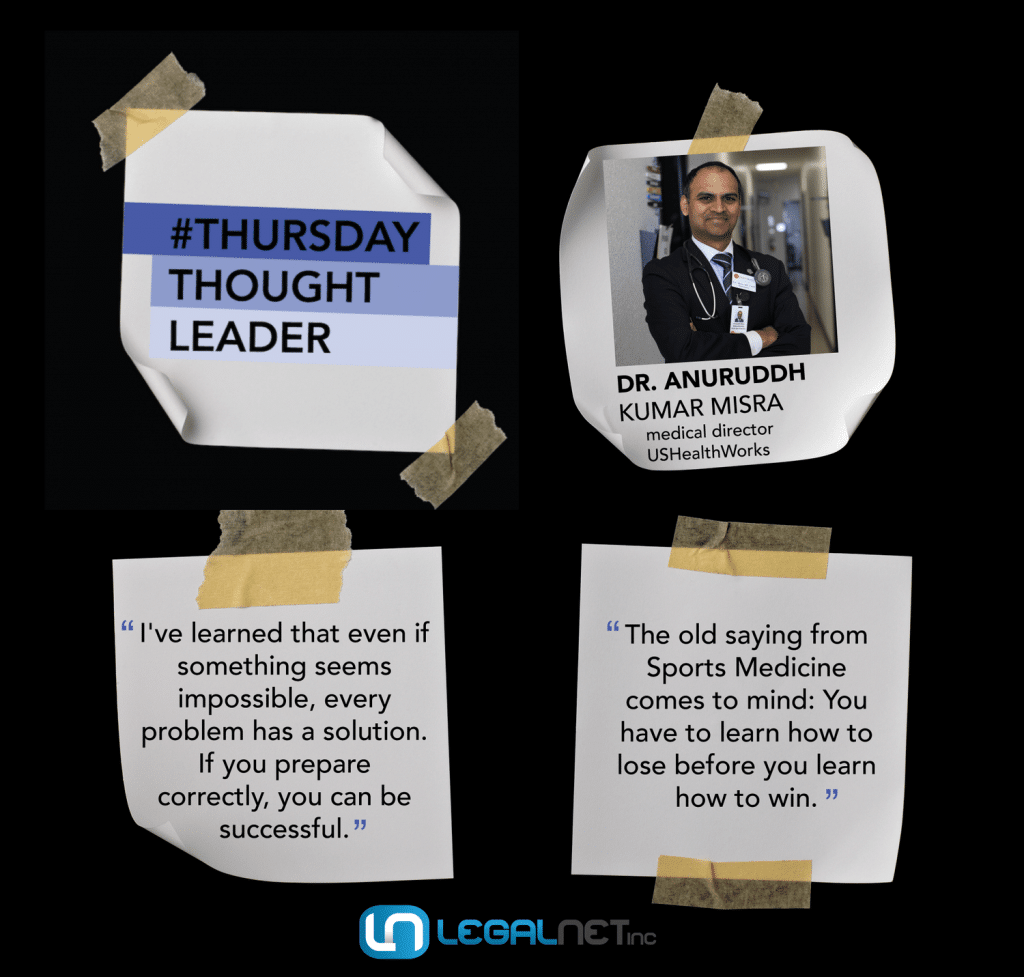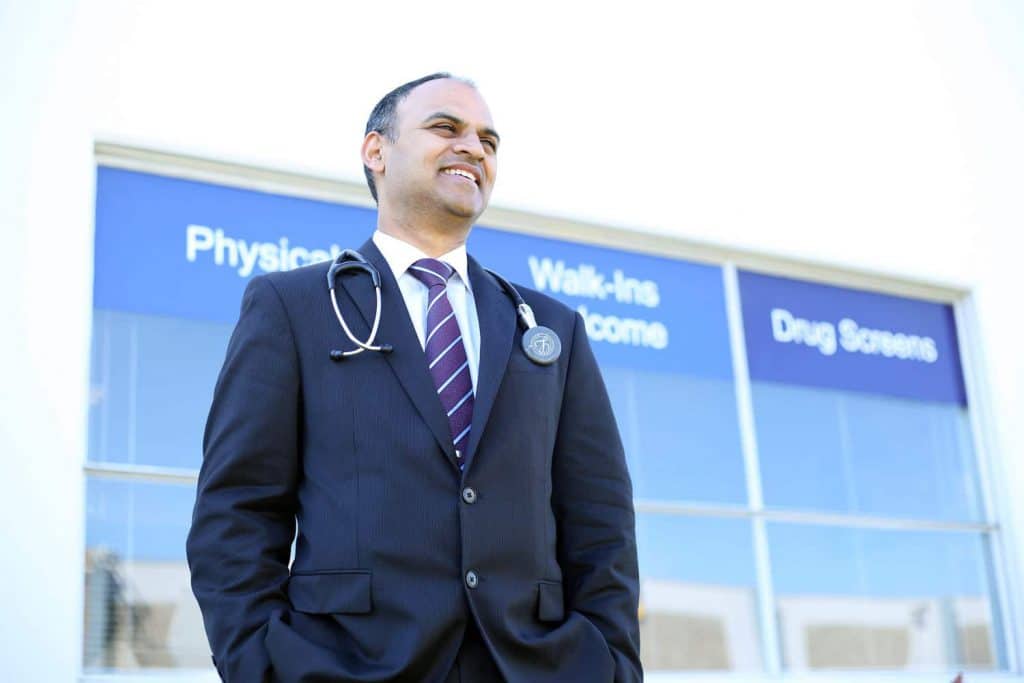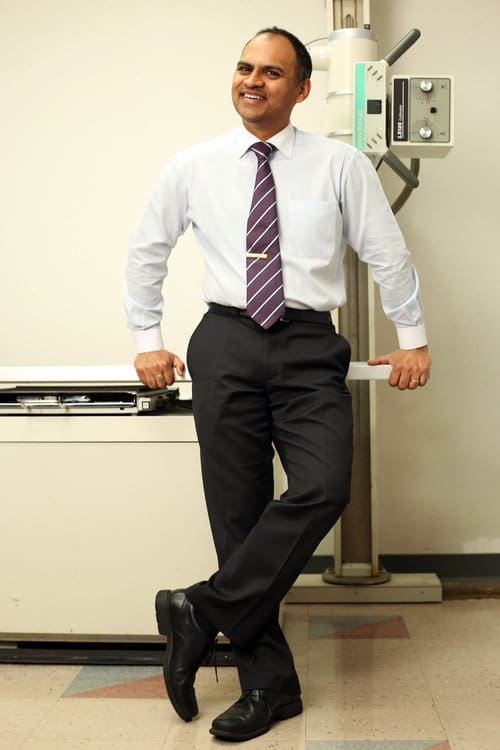
If we had to give Dr. Anuruddh Kumar Misra a singular title, we would say that he is a physician and the current Medical Director at USHealthWorks. But, do we really have to stop there? We can’t.
His resume is an incredible list of achievements that have us wondering how we can keep evolving. Certified in Internal Medicine with a subspecialty of Sports Medicine, Dr. Misra currently spends his days in Occupational Medicine and Urgent Care. He has specialized in the Workers’ Comp Industry since 2008 and mixes his professional time between volunteer work and continuing education.
It’s been incredible getting to know Dr. Misra and if there’s one thing you can take away from all of this, know that the limits are only as high as you set them.
What inspired you to become a physician?
At a young age, I brought some family members to see a physician for certain medical problems and I remember being so impressed with the knowledge of the MDs attending to the care of my loved ones. Specifically, I recall being attracted to their intellect and wanted to build towards being that kind of professional. This led me to choose the field of Internal Medicine after medical school, as we (Internists) are understood to be the “Brain Trust” of medicine to handle all matters, regardless of complexity both in the outpatient context and hospitalized setting. The TV show “House” comes to mind to that end.
While in that series Dr. House went on to do an Infectious Disease subspecialty fellowship, I went on to do a subspecialty fellowship in Sports Medicine because of my passion for competitive sports and dedication as a lifelong athlete. I was so pleased to be able to merge the two passions of my career aspirations. This “merger” was recently featured by US HealthWorks.

Image courtesy of Scottish Rite
Throughout your career, you have checked off one amazing feat after another. Which achievement meant the most to you? Why?
It is hard to say which box check meant the most; each were different in so many ways. Finishing my first year of medical school was huge, but so were the innumerable number of high-stakes exams we all had to take to attain our medical degree, state licensure, and board certifications.
The best answer is this: It was when I was able to start my family. In fact, my daughter was just born last year. It wasn’t until all the main things were all out of the way — med school, residency, licensure, fellowship, and all boards. Ultimately, one does all this not only to serve humanity but to be positioned strongly with respect to life and be able to provide for our loved ones.
What hardships have you experienced in getting to where you are today? How has that helped you?
When I started medical school, there was an Ophthalmology post-doctoral gentleman who lived one floor immediately below me in the flat I was staying in. He was pivotal in my career and was the first explain to me that entering the medical profession profoundly changes you forever. Your mind just “adjusts” to be becoming a physician and it is a completely transformative human experience. During the next few years and decades, he forewarned me that there would be a series of failures in spite of my best efforts and that psychologically, I should prepare for this accordingly.
He was right. I have passed exams I did not expect to pass and failed ones I believed I had exhausted all known resources to expend, only to still fall short. It’s a helplessly numb feeling. Each loss and failure is hard to take, especially as I take great pride in my performance and am competitive by nature.

Image courtesy of Scottish Rite
Nonetheless, failure is a good teacher and I am better for the setbacks I’ve had. Each and every failure I’ve ever had is one I have been able to come back from and then pass successfully. Apart from the humility delivered as an extension of those harsh experiences, I’ve learned that even if something seems impossible, every problem has a solution and if you prepare correctly, you can be successful, even if it’s not at the first pass. All in all, it has made me a better person.,
The old saying from Sports Medicine comes to mind: “You have to learn how to lose before you learn how to win”.
What advice do you have for people who want to become an accomplished leader in their field but are still early on in their career?
Ensure you know what you are willing to sacrifice in order to achieve what you want to achieve. The sooner you can define this for yourself, the better. Changing careers is an extremely tall order; something unthinkable to me as I have been on the same career track since high school, never deviating.
The more support you can get, the better. I was blessed with two extremely supportive parents, and so fortunate to have come across some of the finest people in and out of the profession who made all the difference to get me through tremendously difficult times. Finally, my wife and her greater family deserve a great amount of credit for my more recent successes since she entered my life.
How do you maintain a balance outside of work?
Simply put, I’m a guy who just happens to be a physician; I have innumerable passions and interests outside of medicine which provide me with the professional balance I enjoy.
Have questions on medical issues related to Workers’ Comp? Find Dr. Misra on Twitter!







